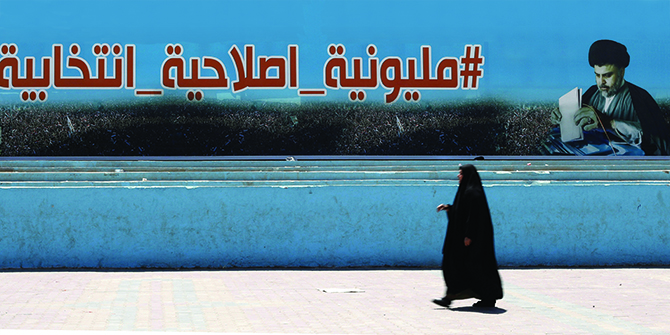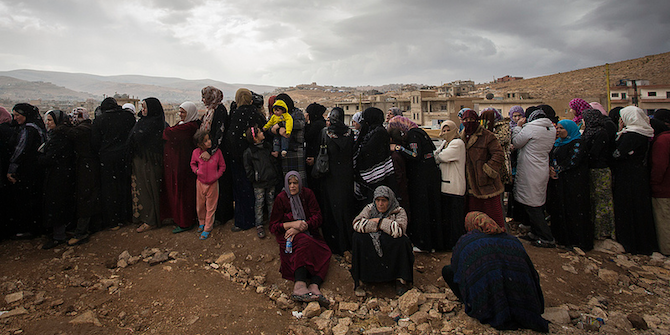by Alexei Abrahams

Earlier this summer, Jared Kushner and the White House unveiled their much heralded ‘peace to prosperity‘ plan for solving the Israel-Palestine conflict. The plan was rightly met with derision across the political spectrum for attempting to place the economic cart before the political horse, essentially front-loading a cocktail of policy fixes that are impossible to implement under the current political status quo.
That habit, however – of thinking about what policy ought to be pursued while postponing the question of how to ensure its implementation – is not a bizarre quirk of the Trump administration, but consistent with how development scholars tend to approach the Middle East. Development economists and public policy researchers pour their time and energy into analysing the causal impacts of policies, but generally ignore the question of how to build political force to ensure that policies get implemented.
The result is an academic literature rich with policy insights orphaned from any coherent theory of change. We can confirm with an impressive degree of precision how the blockade of Gaza suffocates the Gazan economy, and how Israeli army road obstacles in the West Bank disrupt the flow of Palestinian economic activity, but we have no science of how to put an end to those policies. We can show that privilege networks in Egypt stifle job creation and contribute to unemployment, but we have no science of how to dismantle those privilege networks. We are, in short, expert documenters of dystopia; but the science of how to follow through on reform lies outside of our self-imposed bailiwick.
This prioritisation of one scientific line of inquiry over another reflects an underlying prioritisation of one worldview over another. Development scholars implicitly operate under the ‘ignorance hypothesis’, a paradigm in which the binding constraint on development is deemed to be the government’s ignorance about policy impacts. Scholars, so the story goes, can fill the knowledge gap by analysing observational data or running randomised control trials to confirm the causal effects of policies on relevant social outcomes. Governments can then draw upon such studies to shape their policy portfolios more judiciously.
A more compelling paradigm advanced by the political economy and authoritarianism literatures, however, contends that the portfolio of policies adopted by Middle Eastern governments, far from being the result of ignorance, reflects instead the political calculus of self-preservation. Policies, rather than emerging from a technocratic debate about what is or is not socially optimal, are chosen to co-opt or counter-balance various social forces, both domestic and foreign, that might otherwise make their dissatisfaction felt, potentially overthrowing the regime or at least destabilising the political order. According to this paradigm, the binding constraint on development in the Middle East is not the ignorance of policymakers as to what reforms ought to be implemented, but rather their unwillingness to implement such reforms in the face of entrenched interests.
In Palestine, one could say that these two paradigms clashed under the tenure of Prime Minister Salam Fayyad (2007–13). Fayyad, as a former finance minister, IMF country director, and doctor of economics, could scarcely have been a more perfect ambassador of the development paradigm when he assumed the office of prime minister of the Palestinian Authority (PA) in the West Bank. His ambitious technocratic reform programme was initially showered with donor aid and praised by the likes of Thomas Friedman.
But he quickly ran afoul of social forces vested in the status quo. Fayyad believed that if Palestinians proved they were capable of putting their affairs in order and governing themselves, the world would have no choice but to acknowledge Palestinian sovereignty. Sadly, this was not the case. Israel and the United States went along with PA security sector reform so long as it curbed Palestinian militancy against Israel, but the Israeli government was not in a political position to reward such progress with territorial concessions. Abbas went along with Fayyad’s program so long as donor dollars kept flowing into PA coffers, but when their support faltered during the European sovereign debt crises, Abbas deftly redirected popular ire against Fayyad, ultimately provoking his resignation.
The broader lesson here is that a policy portfolio is like a nail that requires the hammer of political force to drive home. Policies may be well conceived intellectually, but to reach fruition they must first break through the logjam of entrenched interests. And such is the hyperconcentrated distribution of power in the Middle East that elites vested in the status quo often have the power to thwart reforms that would benefit society at large.
It follows that if scholars wish to facilitate development in the Middle East, we should leave off assessing policy impacts and concentrate instead on advancing the science of how to redistribute political power into the hands of citizens. Such a science is not what would currently be construed as development, but rather a precursor to development – what should perhaps be called statebuilding. It is the science of how to empower citizens to make their dissatisfaction felt. In a functioning democracy, citizens make their dissatisfaction felt through elections, lawsuits, plebiscites; and as a result, incumbent leaders must internalise citizens’ interests or else face the prospect of ejection from office. In countries where such institutional channels are absent or have calcified, citizens turn to extra-institutional tactics, such as protests, strikes, boycotts, or ultimately insurgency and revolution, the threat of which motivates the incumbent regime to internalise citizens’ interests. The science of development, by assuming the social planner is benevolent, ignores this crucial preliminary stage – statebuilding – in which citizens gradually acquire the means by which to compel their government to act benevolently and choose their policies programmatically.
Of course, this process is guaranteed to be contentious. Any power shift that promises to improve citizens’ bargaining leverage over their rulers will automatically invite preventive violence by the ruling regime. The gruesome murder of Giulio Regeni, a Cambridge development doctoral student, at the hands of Egyptian state security, is a case in point. Regeni was not himself organising Egyptian labour, but merely attending some union meetings and observing. Nevertheless, even this passive role was deemed too worrisome by state security. The incident is indicative generally of the contentiousness of statebuilding, and scholars should beware.
And yet that is the only way forward in the Middle East. Inclusive development cannot be achieved without confronting vested interests, and this will require robust grassroots political organisations – be they labour unions or other kinds of social movements – to break the logjam. Scholars wishing to contribute to the development of the Middle East should ease off policy evaluations and lend their game-theoretic and econometric skills to advancing the science of statebuilding.
Alexei Abrahams is a Research Fellow at the Citizen Lab, Munk School of Global Affairs and Public Policy, University of Toronto. He tweets @abulkhaezuran







